Dental Implants – Boston, MA
Visit the Experts in Digital Implant Planning & Placement
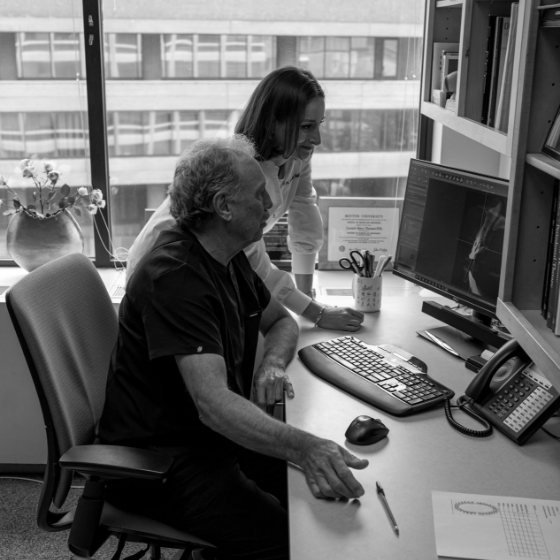
The American College of Prosthodontists estimates that 178 million Americans are missing at least one tooth, while 40 million are missing all of their teeth. If you find yourself dealing with the depressing and confidence-affecting impacts of tooth loss, Boston Prosthodontics Dental Group is the perfect place to go for help.
In addition to rebuilding smiles with dental implants in Boston, our outstanding team of accomplished and extensively trained doctors excels in restoring misplaced and mispositioned implants, allowing us to correct defects so our patients can enjoy more functional and beautiful smiles. Call us today to learn more about these life-changing prosthetics.
Why Choose Boston Prosthodontics Dental Group for Dental Implants?
- Prosthetics Designed for Optimal Function & Aesthetics
- We Restore Misplaced & Mispositioned Implants
- Leaders in Digital Dental Implant Planning & Placement
Who Dental Implants Can Help
Dental implant treatment is incredibly versatile and can be customized to meet each of our patient’s individual needs, whether you’re missing one, several, or all of your teeth. At your consultation, your prosthodontist will outline your treatment plan with you and answer any questions you may have. In most situations, restoring your smile will consist of going down one of the three pathways listed below.
Missing One Tooth

To replace a single tooth, we’ll secure one dental implant below the gumline and into the jawbone. Once it has fused with the bone, we’ll place a small, metal connector piece on top of it called an abutment. This will hold a free-standing, custom-crafted dental crown in place to fill the gap in your smile.
Missing Multiple Teeth

Instead of needing to alter surrounding healthy teeth to support a traditional dental bridge, we’ll place two or three dental implants below the gumline. These will act as anchors that will hold the bridge securely within your mouth, providing you with a complete, beautiful, and functional set of teeth.
Missing All of Your Teeth
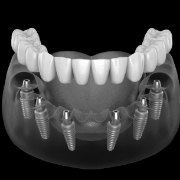
Instead of relying on a traditional denture that restores only the visible portion of your teeth, our team can replace your entire dental structure with implant- retained dentures or provide a completely non removable solution with “All-on–4”. We’ll secure anywhere from four to eight dental implants into the jawbone to hold your fixed prosthesis securely within the mouth. Due to the extra support, your replacement teeth will allow you to eat and speak with ease and will be completely non removable.
All-on-4/All-on-X
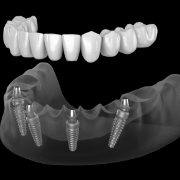
When teeth go missing and the root structure that stimulates the jawbone is not restored, it can lead to jawbone deterioration, impacting your ability to have successful dental implant fusion in the future. In these cases, we may recommend an All-on-4 or All-on-X procedure. Upon examining your diagnostic images, we can find the strongest areas of the jawbone to secure a limited number of dental implants, eliminating the need for a preliminary bone graft, which can take months to heal from. This drastically cuts down your treatment time and allows you to enjoy high-quality, natural-looking results without the added hassle.
Understanding the Cost of Dental Implants

Dental implants in Boston are widely regarded as a valuable investment due to their exceptional function and natural aesthetics. With an impressive success rate of 95% on average, according to the American Academy of Implant Dentistry, you can expect fewer visits for repairs, replacements, and adjustments over time. To learn more about the expected cost of dental implants, continue reading or reach out to us!
Preliminary Treatments & Dental Implant Surgery
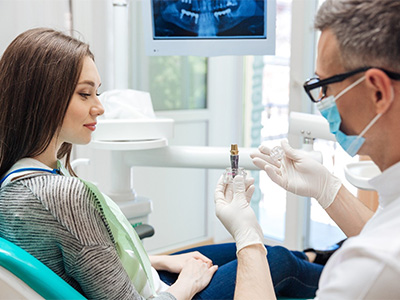
Some patients with tooth loss may require preliminary procedures such as bone grafting, gum disease treatment, or tooth extractions before qualifying for dental implants. While these treatments are essential for ensuring a successful smile, they come with additional expenses.
Choosing Boston Prosthodontics Dental Group for your implant treatment can potentially save you money, as our implant dentists can handle every phase of the process in one location, eliminating the need for multiple office visits and bills.
The Parts of Your Dental Implant
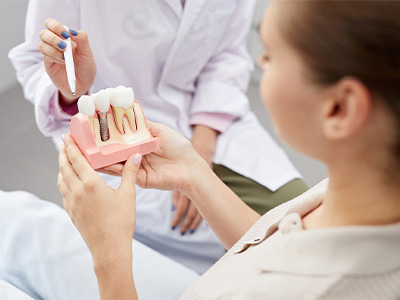
The more implant posts you need, the associated treatment expenses increase as well. Additionally, several factors contribute to the overall cost, including the specifics of the dental implant components. Post sizes can vary depending on their placement in the mouth, and both posts and abutments may be created from different materials by different manufacturers, impacting the final price.
Furthermore, the type of restoration placed atop the implants is a significant cost consideration. For instance, a crown used to restore a single implant typically has lower costs compared to a full denture supported by four to eight implants, as it requires less material.
How Dental Implants Can Save You Money

Despite the initial cost, dental implants offer long-term benefits, including enhanced functionality and comfort. They can save you money over time compared to traditional dentures and bridges, which require frequent replacements and ongoing maintenance expenses. Dental implants are designed to last several decades, making them a worthwhile investment that contributes to better oral health and reduces overall dental care costs.
Does My Dental Insurance Cover Dental Implants?

Most dental insurance plans typically exclude coverage for dental implants, although there could be rare exceptions. For example, insurance might help in offsetting the expenses related to preparatory procedures or the restoration process. We collaborate with numerous well-known insurance providers, and even if you're not within our network, we are happy to review your plan to help you obtain the highest possible coverage.
Making Dental Implants Affordable

Don’t have dental insurance or find that your plan doesn’t offer sufficient coverage? That’s okay! We provide flexible financing through CareCredit. With their low to no-interest payment plans, you can seamlessly integrate your dental implant expenses into your budget, ensuring affordability.
Dental Implant Technology
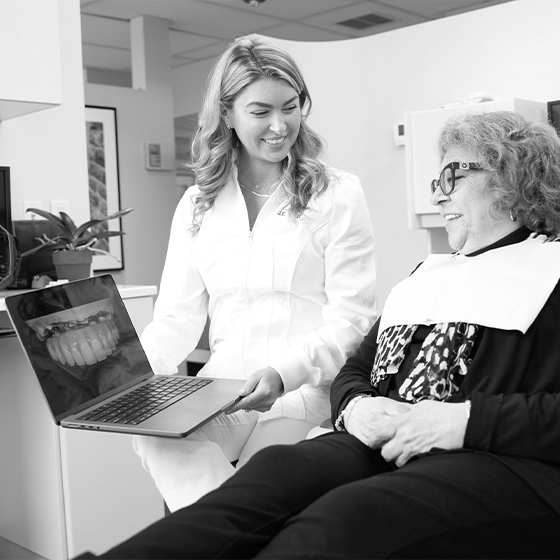
At Boston Prosthodontics Dental Group, we incorporate advanced technology into all of our treatments to improve their success rates. Our sophisticated techniques help streamline your treatment as well as minimize the risk of postoperative complications and discomfort. Our cone beam 3D imaging allows us to precisely place your dental implants in their ideal positions, while our laboratory supplies the highest quality materials to complete your smile. Ultimately, when you visit our team of prosthodontists, you’ll enjoy top-tier results that can last a lifetime.
3D Cone Beam Imaging/3D CT Scanning
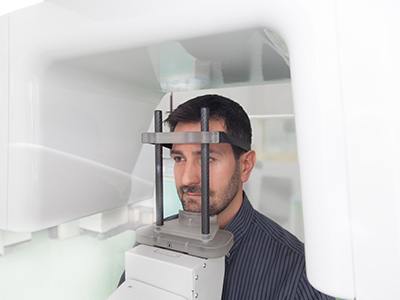
Our 3D cone beam scanner, also called a cone beam computed tomography (CBCT) scanner, is basically like a super-powered X-ray. It uses the same type of radiation as a traditional X-ray, but it is emitted in a cone-shaped beam, which allows it to capture highly detailed, three-dimensional images of your teeth, jawbone, nerves, and connective tissues.
We often use our CBCT machine when planning implant placement. We can also use it to monitor osseointegration (the process of the implants bonding with the surrounding bone). If you ever encounter a problem with your dental implants, which is unlikely, this machine can help us to diagnose the issue and formulate a treatment plan.
CBCT scanning is fast, painless, and non-invasive. Plus, since we have this advanced technology right here in our office, you will not have to worry about visiting an outside practice to undergo necessary scans.
Guided Dental Implant Surgery
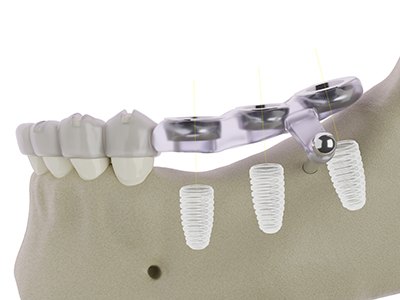
Many dentists perform freehand implant placement. Basically, that means they take their best guess as to exactly where, how deep, and at what angle to place dental implants. This is very often successful, especially in cases where there are few to no complicating factors.
In our practice, we minimize the risk of human error by performing guided dental implant surgery. We use our CBCT scanner to create custom surgical guides for our patients. These guides help us to place your implants exactly where they need to go, thereby reducing the risk of post-op complications and lowering the future chances of dental implant failure. Guided surgery is especially valuable in complex cases, such as those where we must place multiple implants.
Digital Impression System
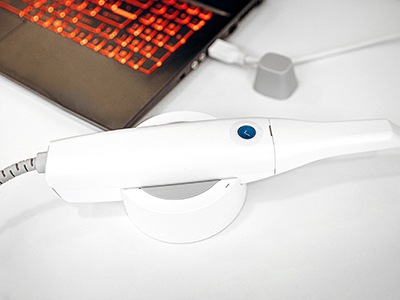
When the time comes for us to design a restoration (crown, bridge, or denture) to attach to your dental implant(s), we will use our high-tech digital impression system. Essentially, all we have to do is move a small, wand-like device around your mouth. It captures thousands of images and assembles them into a digital representation of your smile, which we can then use as the basis for creating your gorgeous new teeth.
Digital impressions tend to be more accurate than old-fashioned manual impressions. They are also faster. Plus, they are more comfortable for patients because they do not involve the use of any putty or bulky impression trays.
Advanced Dental Implant Procedures
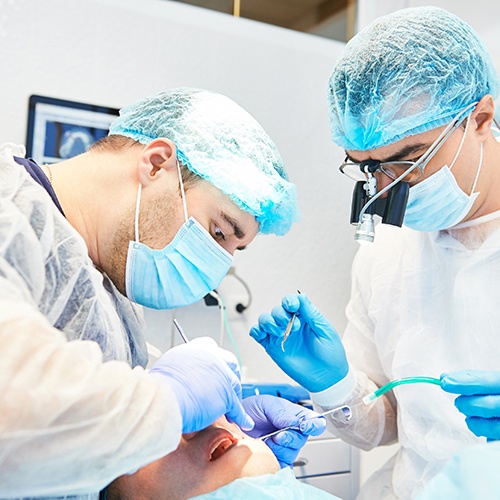
At Boston Prosthodontics Dental Group, our team wants everyone to be able to enjoy the many remarkable benefits of dental implants. However, not everyone is immediately a good candidate for this procedure. That is why we offer advanced services that can prepare your mouth to support dental implants and promote the long-term success of your new smile. Continue reading below to learn about a few of these services.
Bone Grafting
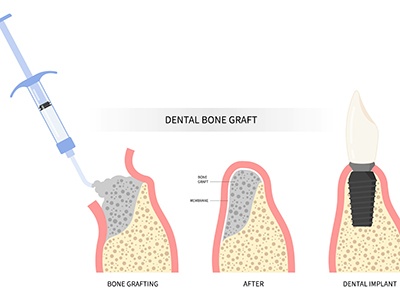
After your natural teeth were extracted, a process known as resorption began. Basically, that means that your body started to recycle your jawbone because it was no longer receiving stimulation from your tooth roots. Over time, resorption can reach the point where the jaw is no longer large enough to support dental implants.
If your jaw is too thin or weak for implants, we may determine that you should undergo a bone graft. There are different types of bone grafts, but essentially, we use natural or synthetic bone material to build up your jaw. The grafted material bonds with your bone, enlarging and strengthening it. In some cases, we are able to perform a bone graft and dental implant placement at the same time. In other instances, there is a mandatory waiting period of several months between the two procedures.
Sinus Lift
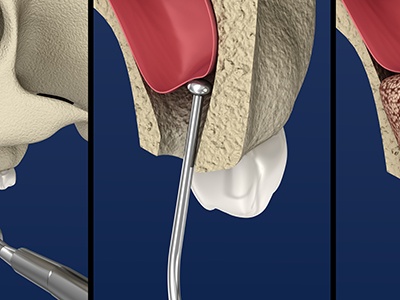
If you have experienced some bone loss in your upper jaw, it might be too short to support dental implants. If we tried to insert implants, they might go all the way through the bone and penetrate your sinus membrane!
To protect your sinuses, we may need to perform a sinus lift. During this specialized bone graft procedure, we carefully access the sinus through the upper jaw. Then, we lift it upward and place bone beneath it to keep it in its new place.
In most cases, patients can receive dental implants 4 – 9 months after a successful sinus lift.
Ridge Expansion
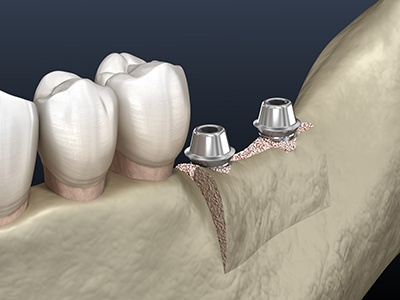
Ridge expansion is also known as ridge augmentation or alveolar ridge augmentation. It is another special type of bone graft.
We often say that dental implants get placed in the jawbone, and that is true. However, they get placed in a particular part of the jawbone, which is known as the alveolar ridge. If the ridge is too narrow to support dental implants, we may need to expand it.
During ridge expansion, we wedge the alveolar ridge apart and place a bone graft in it. After the graft heals, your bone may provide an excellent base for dental implants. (In some cases, implants can be placed during the same appointment as ridge expansion.)
PRP/PRF (Platelet-Rich Plasma & Platelet-Rich Fibrin)
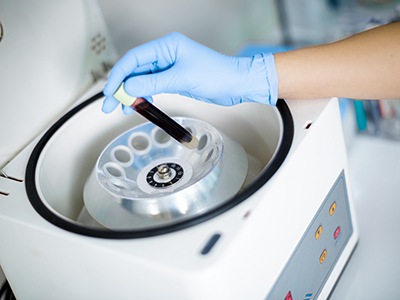
Platelet-rich plasma (PRP) and platelet-rich fibrin (PRF) are derived from your own blood. We place it in a centrifuge and process it in order to extract the portion that is rich in platelets. Then, we apply the PRP or PRF to your surgical site. This technique is clinically proven to reduce the need for pain medications, reduce inflammation, and support a faster recovery. It may also contribute to a lower risk of infection.
Post op dental implant timeline
Days One Through Three

Be gentle around the treatment area in the days following implant placement. You should refrain from strenuous exercise and avoid eating hard foods that could disturb the treatment area. Change the bandaging or gauze frequently and apply ice packs as needed to mitigate swelling. Most patients manage pain by using a low dosage of over-the-counter pain medications. Refer to the post-op instructions that were given to you to help you manage your care and recovery.
Weeks One and Two
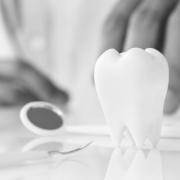
During this time, the swelling will begin to subside. You should be eating soft foods to ensure your comfort. We recommend you regularly rinse your mouth with salt water to promote healing. We will schedule a post-operative appointment at our Boston dental office to monitor your recovery.
Months One Through Six

In the months following dental implant surgery, osseointegration takes place. During this time, the implants will fuse to your jaw. It is essential to maintain good oral hygiene during this time to promote proper healing.
Ongoing Care
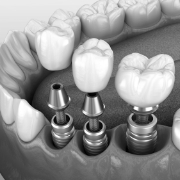
After you have fully healed from implant surgery, your abutments will be attached during a minor surgical procedure. In about two weeks, after your gums have healed, you can receive your permanent restoration. You should care for your implants and replacement teeth the same way you care for your natural teeth: brush twice daily and floss once a day. Oral care at home should be supplemented with regularly scheduled dental visits.
Dental Implants Post-Op Instructions

Osseointegration takes place in the months following dental implant surgery. Through this process, the implants will fuse to your jaw to create a sturdy foundation, so it is essential to maintain good oral hygiene at this time to prevent infections and promote proper healing. Here’s a brief guide to the recovery process as well as what you can do to ensure that your implants from Boston Prosthodontics Dental Group can work well, look beautiful, and last for as long as possible.
What to Do Directly After Dental Implant Surgery

After dental implant surgery, it’s important to leave the blood clot that forms over the treatment area undisturbed so healing can go smoothly. To ensure this, adhere to the following rules:
- Refrain from spitting.
- Do not drink through a straw.
- Do not smoke for several weeks.
- Do not probe at the surgical site with your fingers or tongue.
Common Side Effects When Recovering from Dental Implant Placement

You can expect to experience some mild side effects in the first few days after dental implant surgery. These may include:
- Bleeding that can recur for several days. You can address this by gently applying clean gauze over the wound.
- Swelling for the first 72 hours. You can reduce this and the discomfort it causes with a cold or warm compress.
- General discomfort that can be alleviated with pain medication.
Your Diet After Dental Implant Surgery

It’s best to stick to a diet of soft, mild, non-abrasive foods after receiving dental implants. A few excellent choices include:
- Mashed potatoes
- Ice cream
- Pudding
- Yogurt
- Soup
- Pasta
- Scrambled Eggs
You can resume your normal eating habits when you can do so comfortably, but it’s best to avoid chewing tough or crunchy foods over the implant sites.
Post-Op Health & Oral Hygiene

You should brush your teeth normally the day after surgery but do so gently around the surgical sites. We recommend you rinse your mouth with salt water two to three times daily (ideally after meals) to promote healing after receiving dental implants. Use prescription mouthwash if you have it, but avoid mouthwash brands with high levels of alcohol such as Scope and Listerine.
What to Do After Your New Teeth Are Attached

After you have fully healed from implant surgery, your abutments will be attached during a minor surgical procedure. After your gums have healed about two weeks later, you can receive your permanent restoration. At this point, you may have sensitive gums for a while afterward, but this issue will be easy to address with over-the-counter pain medication. You should care for your implants and replacement teeth the same way you care for your natural teeth: brush twice daily and floss once a day. Oral care at home should be supplemented with regularly scheduled dental visits.
Dental Implant Failure & Salvage

One of the extraordinary benefits of dental implants is that they have a success rate of over 95%! Dental implant failure is very uncommon, but it can still occur in certain scenarios. If you notice that your dental implant feels loose or uncomfortable, or you have other concerns regarding your replacement tooth, don’t hesitate to give us a call. The sooner we can examine your implant, the more likely that we can save it with dental implant salvage treatment.
Learn More About Dental Implant Failure & Salvage
Maintaining & Caring for Your Dental Implants

Your dental implants from Boston Prosthodontics Dental Group are a fantastic investment in your smile's longevity. However, to ensure that they remain strong and secure for a lifetime, it’s important to be consistent with their care and maintenance. Failure to do so could lead to complications or even implant failure! So, follow the guidelines of your prosthodontist and continue reading to learn the best ways to sustain your dental implants.
Make Oral Hygiene a Priority

While dental implants can't decay, the same bacteria that cause cavities also breed gum disease that can threaten their stability. The best way to prevent this periodontal damage is to practice thorough oral hygiene. Brush your teeth twice a day, floss daily, and consider using antibacterial mouthwash to prevent gingivitis and maintain the health of your teeth and gums.
Eat a Healthy Diet

While you can certainly eat whatever you want after your dental implant has fused with your jawbone, it’s still a good idea to be mindful of your diet. Just like regular teeth, dental implants can be vulnerable to bacteria caused by excess sugars and damage from hard or chewy foods. Full, nutritious meals with lean meats, leafy green vegetables, and dairy products are excellent for your dental health. Over time, proper nutrition can also help you curb your sweet tooth and prevent a possible infection down the road.
Break Bad Habits

Certain habits can also cause complications for your dental implants. Avoid smoking or chewing tobacco, as they can slow healing and increase the risk of infection in your mouth. Also, as tempting as it is, refrain from using your teeth as tools or chewing on hard objects like pens or ice to prevent damage to your implants.
Protect Your Dental Implants

If you’re more active than most, another great investment is in protective gear for your smile. Stray balls, physical contact, equipment malfunctions, and falls are all possible when doing any physical activity, especially sports. So, buy a mouthguard to keep your implants and the rest of your teeth safe and sound. If you grind your teeth at night, you may also consider getting a nightguard from our office to protect your investment from wear and tear as you sleep.
Schedule Regular Dental Checkups

In addition to regular home care, professional cleanings and exams are the key to dental implant longevity. While your oral hygiene at home is very important, you can’t see or reach every surface in your mouth. At a professional cleaning in our office, each tooth and implant is given the attention it needs, and we can spot, diagnose, and treat oral issues before they get worse. This is why it’s so important to see us every six months!
What Are Dental Implants?

Dental implants are small, screw-shaped titanium posts that are surgically placed below the gumline and into the jawbone to restore the missing root structure of teeth. Due to their biocompatible nature, they fuse with the bone structure through a process called osseointegration, providing the area with necessary stimulation and blood flow to keep it from deteriorating over time, as you might notice with traditional restorations. Once osseointegration has occurred, your prosthodontist will secure a dental crown, bridge, or denture onto the implants to restore your smile.
The Dental Implant Process

Dental implant surgery is performed in our world-class facilities by prosthodontists who have undergone advanced training. Your dental implant timeline will depend on several factors, including the need for preparatory procedures and the number of teeth you need to replace. Here are the typical steps:
- Consultation During your consultation, the doctor will perform a thorough examination of your teeth, gums, and jawbone using the latest 3D X-ray/CBCT technology. This will allow us to determine if any prerequisite procedures such as tooth extractions are needed, and to create a treatment plan tailored to your unique needs. CBCT also allows planning guided surgery - the most trusted way of placing implants. Your prosthodontist will explain the procedure to you in detail and answer any questions or concerns you may have.
- Preparatory Procedures For patients who require preparatory procedures, a follow-up dental appointment will be scheduled. The prosthodontist will perform any necessary tooth extractions and bone grafting procedures. Healing from tooth extractions generally takes two to three weeks. In cases where bone grafting is needed, it will require an additional three to six months of recovery.
- Dental Implant Surgery During your first placement surgery, your prosthodontist will begin by administering anesthesia and making incisions in the gum tissue. They’ll then place the titanium implants into the bone tissue. The duration of the procedure will depend on how many implants are being placed, but it generally takes two to four hours.
- Osseointegration While you recover from surgery, the implant posts will fuse with your jawbone in a process known as osseointegration. Osseointegration is the most crucial step in the implant process and typically takes about four to six months. The doctor will monitor your progress through a series of follow-up appointments to ensure there are no complications. Alternatively, we offer immediate loading options in some circumstances, which allows the crown or prosthetic to be placed on the same day as the implant with no interim period required.
- Abutment Placement Once the dental implants have completely fused to the bone tissue, the doctor will attach abutments or caps, which facilitate healing. While abutment placement is a minor dental procedure, patients typically need about two to three weeks for gum tissue to heal before receiving permanent restorations.
- Restoration Placement After the healing abutments have been placed, the prosthodontist will take digital impressions of your smile that the dental lab will use to fabricate your custom restoration. Once your implant crown, bridge, or denture is complete, the dentist secures it in place and checks the fit. After any necessary adjustments are made, the treatment is complete.
Why Should a Prosthodontist Place My Dental Implants?

The surgical placement of dental implants is a precise art, and you don’t want to leave that process in the hands of just anyone. A surgically trained prosthodontist and periodontists like the ones here at Boston Prosthodontics Dental Group have undergone years of specialty residency programs and rigorous examinations, and they’re capable of personally handling EVERY stage of your smile transformation, from the initial surgical placement of one or more dental implants to the painstaking design and creation of a beautiful, entirely custom prosthetic. This allows them to create better biologic, prosthetic, and esthetic outcomes for patients in need when it matters most. If you’re going to invest in something as important and life-changing as a brand-new smile, why not trust that goal in the hands of true experts?
Benefits of Dental Implants

- Restored Function Dental implants give excellent stability to your replacement teeth, allowing you to eat a wider range of foods, enunciate with greater clarity, and achieve a normal-looking smile. You can enjoy the foods you like, including whole fruits, steaks, and even chewing gum, without worrying that your dental restoration will shift.
- Designed to Last For the right candidates, dental implants are widely regarded as the best solution for missing teeth. Dental implants themselves are crafted from biocompatible titanium and when properly cared for, they can last a lifetime. Meanwhile, your implant-supported crown, bridge, or denture will be crafted from high-grade porcelain that is durable, natural-looking, and stain-resistant.
- Improved Health Our teeth are constantly stimulating the bone tissue in the jaw. When you have a missing tooth, the jaw will begin to atrophy. Implants replace the tooth roots and are the only form of dental restoration that can stop this bone recession. Among many other benefits, this effect can help to protect your remaining natural teeth and contribute to good oral health in general.
- Enhanced Quality of Life Few things in life are fundamentally more enjoyable than savory meals, long talks with friends, and sharing smiles with those you love. Dental implants make it possible to experience these simple joys to the absolute fullest. Our natural-looking dental implant-supported dentures and other restorations give you the confidence to show off your smile with pride, boosting self-esteem and improving your quality of life.
Dental Implant FAQs
How Successful Are Dental Implants?
When placed by a skilled professional, dental implants have a success rate that’s over 95%! There are a few factors to contribute to the success of dental implants. They include how well you take care of them with your oral hygiene, routine checkups, and diet. Success can also vary based on where the implant is placed in your mouth. Since molars tend to receive more strain from chewing than the front teeth, they are slightly more likely to fail than dental implants that are placed in the front of the mouth.
How Long Does It Take to Recover from Dental Implant Surgery?
Most patients can resume their normal activities the day after their dental implant surgery. However, you should refrain from strenuous exercise for about a week or so because this can delay healing. The bleeding should subside after a couple of days and swelling should reduce after three to four days. Remember to take all of your prescribed and over-the-counter pain relievers as directed. It will take up to six months for your implants to completely fuse to the jawbone.
Can I Get Dental Implants If I Smoke?
It is possible to get dental implants if you are a smoker, but smoking puts you at a higher risk of dental implant failure. This is because smoking tobacco causes dry mouth, slows down healing, and interferes with the implants’ ability to fuse with the jawbone. Smoking after dental implant placement can also result in dry socket. If you smoke, it’s important that you quit at least two weeks before the procedure and several months afterward. This is also a great opportunity for you to kick the habit permanently!
Is There Anything I Shouldn’t Eat with Dental Implants?
For the first few weeks after your dental implant placement surgery, is it best to avoid foods that are difficult to chew. You should also refrain from consuming beverages that are alcoholic, sugary, or acidic – and don’t use a straw. After the implants have completely healed, you can eat pretty much anything you want. Of course, it’s still a good idea be to careful when it comes to foods that are particularly hard or sticky, but there is no need to put limitations on your diet.
How Long Do Dental Implants Last?
One incredible advantage to replacing missing teeth with dental implants is that you likely won’t have to worry about replacing them anytime soon. Unlike dentures and dental bridges, these restorations are known to last 30+ years, although their longevity depends on how well you take care of them.
A consistent at-home hygiene routine is imperative to keeping them in good shape. You should brush, floss, and rinse with mouthwash twice daily (both morning and night). You should also visit our team every six months for a routine checkup and cleaning. This allows us to identify and resolve any areas of concern, like a loose prosthetic, before they progress into a real problem.
Does Getting Dental Implants Hurt?
Many patients want to know what symptoms to expect after their procedure and whether it will hurt. You’ll be numbed and sedated for the surgery itself, which reduces your body’s ability to register or remember any discomfort that might occur. You’ll likely feel calm and comfortable until later, when the medications start to wear off.
It’s normal to experience mild to moderate aches and inflammation for a few days as you recover. Typically, it peaks around day three after your procedure and then gradually fades. It’s usually safe to take over-the-counter meds like Tylenol or ibuprofen to mitigate symptoms, and applying a cold compress to your face can provide a much-needed numbing effect.
If you have pain that doesn’t dissipate or gets worse, contact us immediately so we can ensure that you’re healing as intended.
Are Dental Implants Safe?
For most patients in good health who visit a qualified professional, these restorations are generally incredibly safe and successful. However, if you have a preexisting condition that might interfere with your results, that will have to be addressed first.
For instance, if our team finds signs of gum disease at your consultation, we can’t move forward until it’s cleared. Also, if you don’t have sufficient jawbone density, you might need an additional bone graft procedure to bulk it up. Then, once you’ve fully recovered, you can undergo implant surgery.
What Can Cause Dental Implants to Fail?
Although implant failure is uncommon, when it does occur, it’s usually due to one of two common culprits: peri-implantitis or failed osseointegration.
The former is a dangerous form of gum disease that develops from poor oral hygiene habits following your procedure. If bacteria penetrate the tissue around your restoration, it can cause inflammation and infection that can spread to your jawbone and weaken it. This leaves your teeth without a firm enough foundation, and your prosthetics could fail.
Also, if your bone is too thin or your body doesn’t produce enough new growth, the titanium rod of your implant might not fuse successfully with your jawbone. Without the added strength and stability this process provides, it can become loose or fail altogether.
